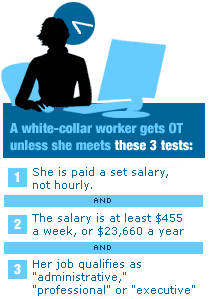8.23.2004
NEW YORK (CNN/Money) - Controversial new rules regarding overtime pay went into effect Monday, with the Bush administration and labor advocates squabbling over how many U.S. workers are affected.
The changes mark the first major overhaul of the federal overtime law in more than 50 years.
The Labor Department says the new rules will strengthen overtime rights for 6.7 million American workers, including 1.3 million low-wage workers who were denied overtime under the old rules.
| Overtime Class Action Attorneys
Class action law firm to handle overtime pay violation cases. Contingency fee -... www.schneiderwallace.com Overtime Pay
Lorman Education - Choose from a variety of seminars designed to meet the... www.lorman.com Articles on Overtime Pay
KeepMedia offers thousands of articles from leading publications like... www.keepmedia.com Calculating Overtime under the FLSA
Free article and policy. Plus extensive management rationale and legal... www.ppspublishers.com | ||
But groups, including the AFL-CIO, say the rules will bar 6 million workers from getting time and a half. There's a Capitol Hill protest of the rules scheduled Monday.
In Saturday's Democratic Party radio address, vice presidential candidate Sen. John Edwards blasted the rules.
"Why would anyone want to take overtime pay away from as many as 6 million Americans at a time when they need that money the most?," Edwards asked.
Under the law, there are three primary tests for determining who is eligible ("non-exempt") and who is not ("exempt") from overtime pay.
First up is the "salary-basis" test. To be exempt from overtime, workers must be paid a set salary, not an hourly wage. This has long been the rule under federal overtime law. The new rules don't change this requirement.

The second criteria, called the "salary-level" test, has been amended. In order to be exempt from overtime, the new rules require that employees earn a minimum salary of $455 a week, or $23,660 a year. That's triple the prior minimum salary of $155 a week, or $8,060 a year.